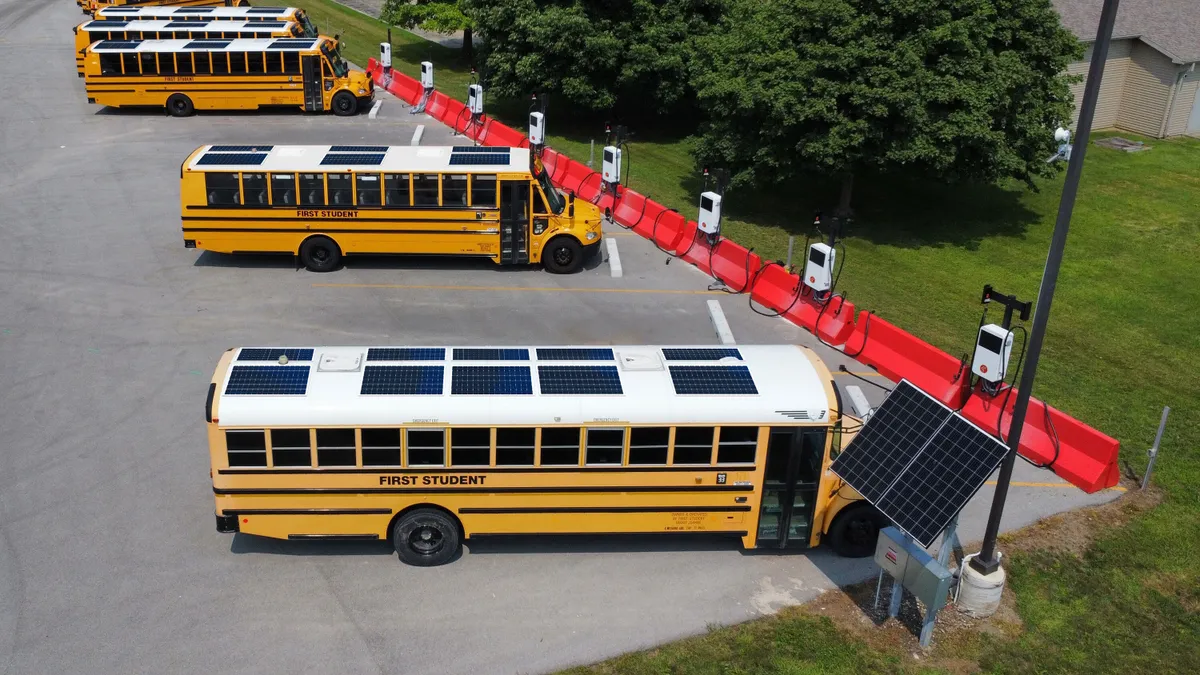U.S. infrastructure received a mediocre 'C-' grade from the American Society of Civil Engineers (ASCE) in a report card released Wednesday, prompting leaders to renew their calls for greater investment.
The grade is a slight improvement from ASCE's last report card in 2017, which rated the country's infrastructure at a D+, but the current report card still highlights plenty of concerns for local leaders.
Public transit received the lowest mark of all the 17 sectors assessed by ASCE with a D-, while the country’s roads and bridges received a D and C, respectively. The nation's rail infrastructure is in the best shape, according to ASCE, scoring a B grade.
Making the grade
For the U.S. to improve its overall grade, ASCE warns there's much work to be done. Of the 17 sectors evaluated, 11 received a D-range grade. And the 10-year infrastructure investment gap now stands at $2.6 trillion, up from $2.1 trillion in 2017.
Former ASCE President Greg DiLoreto said at a press conference that while "we're going in the right direction," the funding gap is "a shortfall that must be addressed by all levels of government and the private sector."
"This is not a report card anyone would be proud to take home," ASCE Executive Director Tom Smith said in a statement. "We have not made significant enough investments to maintain infrastructure that in some cases was built more than 50 years ago."
ASCE member of the Committee on America's Infrastructure Michael Schipper called the transit grade "depressing," especially as the sector faces a $176 billion investment backlog. He noted that 45% of Americans have no access to transit, while 36% of the sector's storage yards and maintenance facilities and 19% of its vehicles are in poor condition.
Clarion calls for federal investment
Transportation has been a particular focus in Congress as elected leaders look to reauthorize the Fixing America's Surface Transportation (FAST Act), which expires in September. House Democrats last year passed the Investing in a New Vision for the Environment and Surface Transportation in America (INVEST in America) Act, but it went nowhere in the U.S. Senate.
With that discussion set for revival in the spring, in addition to a potential COVID-19 stimulus bill in the offing if the American Rescue Plan is passed to help ease the immediate economic pain, Scott Goldstein, a policy director for advocacy group Transportation for America, said on a recent webinar there is a "once in a generation opportunity" to invest in infrastructure.
ASCE's report card also prompted a pledge of federal help from Rep. Peter DeFazio, D-OR, who chairs the House Committee on Transportation and Infrastructure and said Congress must lead the way.
"This is not acceptable," DeFazio said, referring to ASCE's overall grade, in a video message coinciding with the report's release. "The states can't go it alone. The cities can't go it alone. They need a federal partner."
But the price tag for such legislation remains a thorny issue — at least at the federal level. ASCE noted the popularity of state and local ballot initiatives that raise revenues to pay for infrastructure, including local gas taxes, which often are approved by wide margins.
"It's not just going to be a gas tax, we're going to have to look at how we leverage other funding sources and come up with a comprehensive package, because it is a big nut."

Maria Lehman
Director of U.S. Infrastructure, GHD
Congress has not raised the federal gas tax since 1993, but Maria Lehman, U.S. infrastructure director at engineering firm GHD, said during the press conference that the popularity of increases on local gas taxes should be an "aha moment" for Congress and inspire them to raise the tax nationally.
She acknowledged though that with the gas tax's long-term viability in question, leaders will need "lots of tools in the toolbox."
"It's not just going to be a gas tax," she said. "We're going to have to look at how we leverage other funding sources and come up with a comprehensive package, because it is a big nut."
Renewed hope for bold action
Regardless of how infrastructure is funded, there must be flexibility baked into how the funds are spent locally as each jurisdiction has different needs, according to leaders on a webinar to relaunch Accelerator for America's "New Playbook for Infrastructure," which first rolled out last year.
"Innovation and flexibility at the local level is key," U.S. Sen. Catherine Cortez Masto, D-NV, said. "Without putting too many restrictions on the federal dollars and the support and the incentives that we need, we have to allow for that innovation to occur, because each community is different."
False promises about infrastructure investments have been made in the past, including during former President Trump's administration when commitments were made to a big package and there was an apparent willingness in Congress to find common ground. But ultimately, city leaders were left disappointed by the lack of progress made.
With the Biden administration and new Transportation Secretary Pete Buttigieg in place, however, some industry leaders' hopes have been raised once again, and interested parties have called for renewed efforts.
Siemens USA CEO Barbara Humpton sent an open letter to congressional leaders noting the "tremendous opportunities" for infrastructure investment, including building and expanding rail and welcoming a "new era" for electric vehicles.
Elected officials in Congress will be able to take bold action if they can look long-term beyond their district boundaries and instead at impacts on the country, Marc Buncher, president of Siemens USA's Mobility Division, said in an interview before the report's release.
"When the federal folks start to think about things that are outside of their region and start to think about the change in the country, that's when we'll really start to get the benefit and the bigger bang for it," Buncher said. "[It's] getting people to think, 'Who cares how much it costs? What's the payback for it? What's the payback to the city, the country, the jobs, the state, all of those things?' I think it's just around education."




















